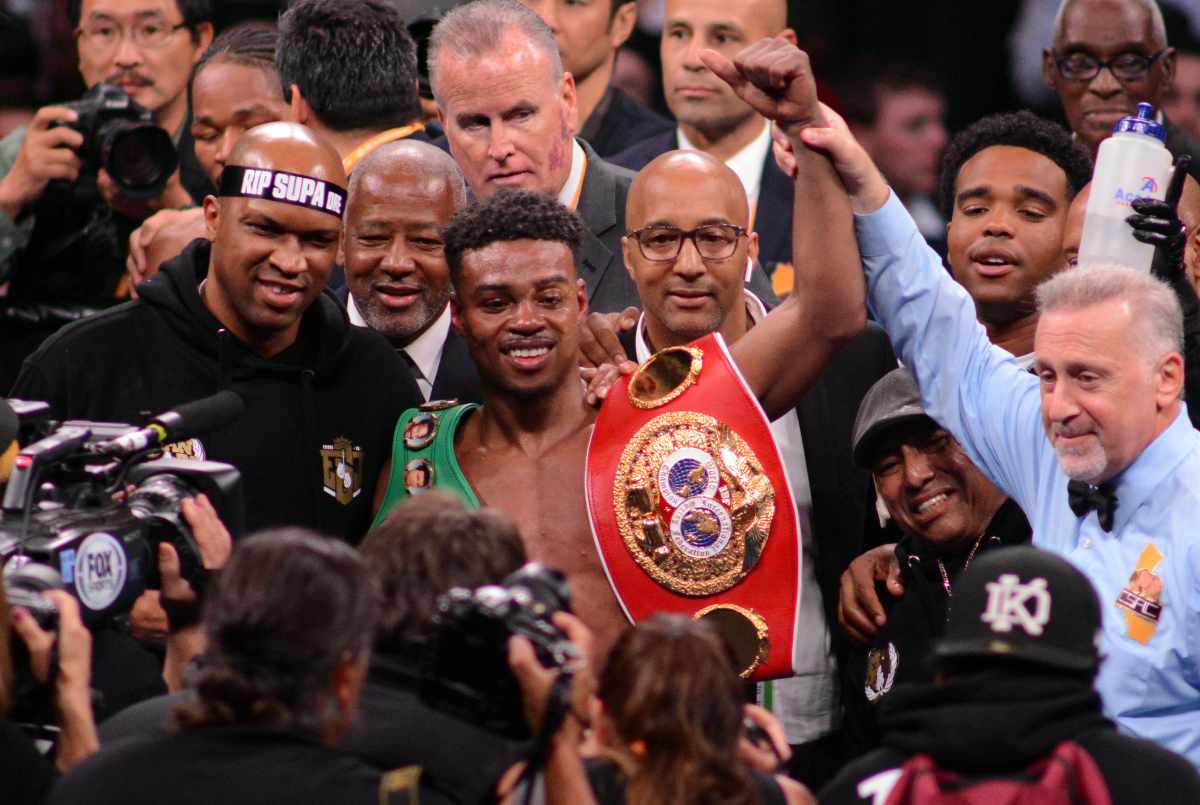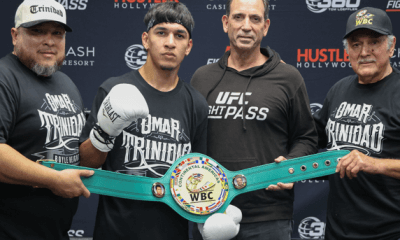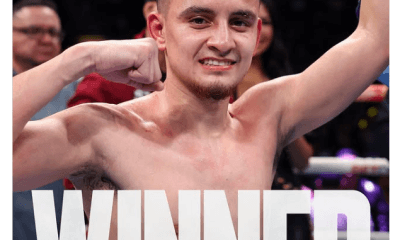Featured Articles
Errol Spence Wins Split Decision and Other Results from L.A.

LOS ANGELES-Sometimes long shots pay off but not this time, as heavily favored IBF welterweight titlist Errol Spence Jr. eked out a victory over Shawn Porter to add the WBC welterweight world title to his collection on Saturday.
If this were thoroughbred horse racing the long shot would have paid off, instead it was prizefighting and Spence Jr. used a single left cross to Porter’s chin to separate himself and win the unification battle before a crowd of more than 16,000 fans at Staples Center.
For 12 solid rounds both Spence and Porter displayed how they reached championship status with two distinctly different but successful styles.
Porter jumped on Spence with his special blend of pressure fighting featuring head movement, side steps and barging forward with both fists pumping from all angles against the thin-framed southpaw Texan.
It took Spence several rounds to adapt.
Despite the steady pressure of Porter, the composed Spence relied on his high guard and pivots to evade the rushes of the eager Ohio fighter. Around the third round Spence began finding success with stinging shots to the body, especially with the left uppercut dig. But most of the punches were fired from close range.
Not wanting to show weakness, Porter opened up the fourth round with even more vigor and seldom allowed Spence his footing. In the following round Spence recaptured the lost ground with his own intensified attack. Back and forth each rallied against the other.
During a savage Porter attack in the 11th round, the clever Spence delivered a crisp sidewinder left cross to the shorter fighter’s chin and down went “Showtime” Porter. You could see that the Ohioan knew that could be the difference in the fight when his hand touched the canvas.
Porter acknowledged the knockdown to Spence then urged him to try it again. The round ended with no further examples of power but the confidence seemed to seep out of Porter’s usually confident face. Inside he knew that single left cross could be the difference between winning or losing. It was a three-point swing in scoring because Porter was winning the round until the knockdown.
The final round saw both try to open up, but they were either tired or cautious and it was difficult to pick the winner of the final frame. After 12 rounds one judge scored it 115-112 for Porter while two others scored it 116-111 for Spence who becomes the WBC and IBF welterweight champion.
“I give it to Shawn Porter, he’s a rough and tough fighter,” said Spence after the decision was read. “He always comes to fight. I wanted to show that I could sit there and hang with him.”
Porter was very gracious in defeat.
“He’s a strong kid. He got the split decision, he was victorious,” said Porter. “I think the knockdown was the difference.”
Benavidez Regains Title
David Benavidez (22-0, 19 KOs) regained the WBC super middleweight world title by knockout from titlist Anthony Dirrell (33-2-1, 24 KOs) when Dirrell’s corner asked the referee to stop the pummeling in the second half of the fight.
Until the eighth round the taller and younger Benavidez was in control of the fight but Dirrell refused to quit despite a gash above his right eye suffered during a heated exchange. Benavidez repeatedly battered Dirrell with wicked combinations but the Flint, Mich. fighter kept looking for a knockout blow through the blood and hammering.
The ringside physician inspected Dirrell’s eye on several occasion from the sixth round on but the fight resumed. And when Benavidez connected with heavy blows from there on, Dirrell refused to go down. It was an impressive display of valor.
In the eighth round Benavidez opened up with impunity and had Dirrell trapped in a corner when one the Michigan fighter’s cornermen asked to stop the fight. An inspector waved a towel as Benavidez battered Dirrell and referee Tom Taylor finally noticed and stopped the fight at 1:39 of round eight. Benavidez was declared the new WBC super middleweight world champion.
“It’s probably the hardest fight that I’ve been in; a very tactical fight. It wasn’t easy,” said Benavidez who hugged Dirrell immediately after the fight ended. “Now I’m a two-time world champion. I got a lot of respect for him.”
The respect was acknowledged several times during the fight as Dirrell asked to continue despite the bleeding cut and opportunities offered by the referee and ringside physician.
“I felt him. He fought his ass off and he did what he had to win the title,” said Dirrell. “Of course I could have kept going. I didn’t quit, I kept going. He likes to get in the inside. He’s a true champion.”
Benavidez reclaimed the WBC title he lost last year due to a failed drug test. When he had first won the title he was the youngest ever to win the title at 168 pounds.
Barrios
A battle for the WBA super lightweight world title saw Mario Barrios (25-0, 16 KOs) floor Russia’s Batyr Akhmedov (7-1, 6 KOs) in the fourth round and seem in total control. But after the knockdown, Akhmedov rallied furiously and mounted pressure on the taller fighter from San Antonio to win the later rounds.
Barrios was able to use his quickness and length at first, but once Akhmedov got inside he took control, especially in the second half of the fight. In the final round, with the Russian fighter winning many of the later rounds with pressure, Barrios connected with a well-placed right hand missile that dropped Akhmedov. He beat the count but lost the momentum and the round.
All three judges scored it for Barrios 114-112, 115-111, 116-111 who now holds the WBA world title in a division ripe with many talented fighters.
Josesito Wins
Josesito “Riverside Rocky” Lopez (37-8, 20 KOs) won by knockout over fellow warrior John “The Gladiator” Molina (30-9, 24 KOs) in the eighth round in a fight that surprised some that it passed the first round in a welterweight clash.
Lopez jumped on Molina with a lead right cross and floored Molina early in the first round. When the fight resumed Lopez decked Molina again with a counter right cross and it didn’t look good. But he survived.
If you followed Molina’s career, you know that he’s been floored before early in several fights and rallied to win by knockout. But not this time. Though Molina set several traps, Lopez was wary of them and used a long left jab and side steps to stay out of Molina’s power zone. It proved beneficial.
Molina mounted a rally in the fifth round when he connected with multiple overhand rights. One seemed to stun Lopez but he managed to avoid the follow-up blows from Molina.
In the seventh round, Lopez surprised Molina with a stiff jab and right cross and down went Molina for the first time since the first round. Lopez attacked until the bell ended the round.
“I knew John Molina was not going to quit. He’s a warrior,” said Lopez. “I had to keep on the pressure.”
After a lengthy huddle with the ringside physicians and Molina’s trainers, he was allowed to proceed to the eighth round. Lopez did not waste time and unleashed a furious five-punch combination that snapped Molina’s head back. Referee Ray Corona saw enough and stopped the fight with Molina standing at 39 seconds into the eighth round.
“It was a pleasure being in the ring with John Molina. I’m very thankful for all of these opportunities,” said Lopez.
Ghost
Former multiple-weight world champion Robert “The Ghost” Guerrero (36-6-1, 20 KOs) looked sharp against an awkward but stealthy foe in Jerry Thomas (14-2-1, 8 KOs) of Kansas and won by unanimous decision after 10 rounds in a welterweight clash.
Thomas had a jitterbug type of defense and though it was tough to gauge, Guerrero has seen every type of style in his near 20-year career and pummeled the body. And when there was any doubt, he pummeled the body again.
Guerrero was in control for almost all 10 rounds but Thomas had his best round in the ninth round when he changed gears from all-defense to all-offense. The braided Thomas landed some flush uppercuts from the left and right and would not allow Guerrero to counter. Still, Guerrero slipped out of the attack and the round came to a conclusion. It was the only round Guerrero did not win.
Two judges scored it 99-91 and another 98-92 for Guerrero who fights out of Gilroy, Calif. the site of the assault by gunfire that took the lives of four at a Garlic Festival in August. Guerrero pledged to give part of his purse to the victim’s families.
Prelims
Michigan’s hard-hitting super welterweight Joey Spencer (9-0, 7 KOs) clobbered Travis Gambardella (5-1-2, 2 KOs) with body shots and double hooks to the head, dropping the Northeasterner three times in two rounds. Then Gambardella buckled down and fought back, connecting with a right that made Spencer pause. It looked like a competitive fight was on the horizon in the third round but when Spencer connected with a left hook to the head, referee Ray Corona stopped the fight. Gambardella argued to keep going but the fight was ruled over at 56 seconds of round three.
“He had been down three times. I think the ref didn’t want another tragic event and stopped the fight,” said Spencer.
Michoacan’s Jose “El Rayo” Valenzuela (5-0, 2 KOs), a southpaw, fired a double left cross to knock out Charles Clark (2-5-1, 1 KO) of Dallas in the first round of a super featherweight bout. After some tentative exchanges, Valenzuela and Clark opened up and the Mexican struck fast with a lead left cross and another one as Clark tumbled to the floor. The referee did not bother to count and ended the fight at 1:06 of the first round.
Photo credit: Al Applerose
Check out more boxing news on video at The Boxing Channel
To comment on this story in The Fight Forum CLICK HERE
-

 Featured Articles3 weeks ago
Featured Articles3 weeks agoThe Hauser Report: Zayas-Garcia, Pacquiao, Usyk, and the NYSAC
-

 Featured Articles2 weeks ago
Featured Articles2 weeks agoOscar Duarte and Regis Prograis Prevail on an Action-Packed Fight Card in Chicago
-

 Featured Articles1 week ago
Featured Articles1 week agoThe Hauser Report: Cinematic and Literary Notes
-

 Book Review4 days ago
Book Review4 days agoMark Kriegel’s New Book About Mike Tyson is a Must-Read
-

 Featured Articles4 weeks ago
Featured Articles4 weeks agoManny Pacquiao and Mario Barrios Fight to a Draw; Fundora stops Tim Tszyu
-

 Featured Articles4 weeks ago
Featured Articles4 weeks agoArne’s Almanac: Pacquiao-Barrios Redux
-

 Featured Articles3 weeks ago
Featured Articles3 weeks agoRemembering Dwight Muhammad Qawi (1953-2025) and his Triumphant Return to Prison
-

 Featured Articles4 weeks ago
Featured Articles4 weeks agoOleksandr Usyk Continues to Amaze; KOs Daniel Dubois in 5 One-Sided Rounds


















